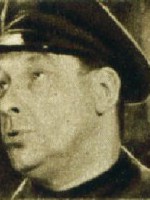George Formby est un Acteur et Ecrivain Britannique né le 26 mai 1904 à Wigan (Royaume-uni)
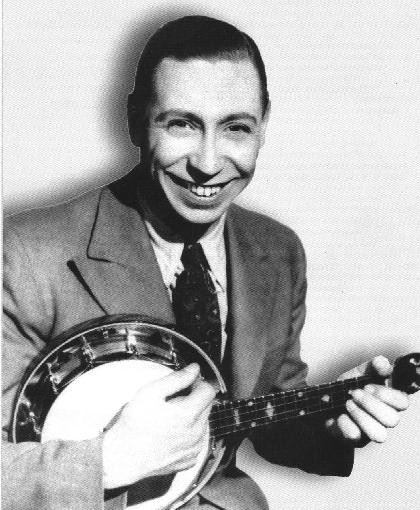
This article is about the Ukulele player, singer and comedian. For his father (1875–1921), see George Formby, Sr.
George Formby, OBE (26 May 1904 – 6 March 1961), was a British actor, singer-songwriter and comedian. He sang light, comical songs, usually playing the ukulele or banjolele. He was a major star of stage and screen in the 1930s and '40s, when Formby became the UK's highest-paid entertainer. His songs such as "When I'm Cleaning Windows" were particularly popular during the Second World War (1939–45).
When he and his wife travelled throughout the war, creating improvised lyrics to songs to fit the situation, they delighted their audiences. It was estimated that they played before three million Allied servicemen and women.
His 1937 song, "With My Little Stick of Blackpool Rock", was banned by the BBC because of its suggestive lyrics. Formby's cheerful, innocent demeanour and nasal, high-pitched Lancashire accent neutralised the shock value of the lyrics; a more aggressive comedian such as Max Miller would have delivered the same lyrics with a bawdy leer.
His best-known catchphrase was probably "It's turned out nice again!". In 1960, his last recorded song "Happy Go Lucky Me" / "Banjo Boy", peaked at number 40 in the UK Singles Chart. Since his death in 1961, a remix version of "When I'm Cleaning Windows" by 2 In A Tent charted in the early 1990s.
Formby was born George Hoy Booth at 3 Westminster Street, Wigan, Lancashire. The eldest of seven surviving children, Formby was born blind because of an obstructive caul. His sight was restored during a violent coughing fit or sneeze when he was a few months old. His father, James Booth used the stage name George Formby, adopted from the town of Formby, Lancashire. He was one of the great music hall comedians of his day, fully the equal of his son's later success. His father, not wishing him to watch his performances, moved the family to Atherton Road in Hindley. It was from there that the younger Formby was apprenticed as a jockey when he was seven. He rode his first professional race at 10, when he weighed less than 4 stone (56 lb; 25 kg).
The family next moved to Stockton Heath, Cheshire, in a home on London Road. It was from there that the young George began his career as an entertainer.
Stage career
In 1921, three months after the death of his father, Formby abandoned his career as a jockey and began appearing in music halls using his father's material. At first he called himself George Hoy, using the name of his maternal grandfather, who came from Newmarket, Suffolk, where the family was engaged in racehorse training.
In 1923 while he was appearing in music hall in Castleford, Yorkshire he met Beryl Ingham (born in 1901 in Accrington, Lancashire), a champion clogdancer and actress, who had won All England Step Dancing title at the age of 11 and had formed a dancing act with her sister, May, called "The Two Violets". They married in Formby's birth town of Wigan, Lancashire the following year.
The couple worked together as a variety act until 1932, when she became his full-time manager and mentor, though she appeared in two of his films for which Formby was paid up to £35,000 per performance. It was Beryl's business skill and tough character that guided Formby to be the UK's highest-paid entertainer.
Formby endeared himself to his audiences with his cheeky Lancashire humour and folksy North of England persona. In film and on stage, he generally adopted the character of an honest, good-hearted but accident-prone innocent who used the phrases: "It's turned out nice again!" as an opening line; "Ooh, mother!" when escaping from trouble; and a timid "Never touched me!" after losing a fight of almost any description.
What made him stand out, however, was his unique and often mimicked musical style. He sang comic songs, full of double entendre, to his own accompaniment on the banjolele, for which he developed a catchy and complicated musical syncopated style that became his trademark, and which he had allegedly taken up as a hobby and first played it on stage for a bet. His best-known song, "Leaning on a Lamp-post" was written by Noel Gay. He recorded two more Noel Gay songs, "The Left-Hand Side of Egypt" and "Who Are You A-Shoving Of?" Over two hundred of the songs he performed, many of which were recorded, were written by Fred Cliffe and Harry Gifford, either in collaboration or separately, and Formby was included in the credits of a number of them, including "When I'm Cleaning Windows".
Some of his songs were considered too rude for broadcasting. His 1937 song, "With My Little Stick Of Blackpool Rock" was banned by the BBC because of its suggestive lyrics. Formby's songs are rife with sly humour, as in "Mr Wu's A Window Cleaner Now" where Formby is about to sing "ladies' bloomers" and suddenly changes it to "ladies' garters"; and in 1940's "On the Wigan Boat Express," in which a lady passenger "was feeling shocks in her signal box." Formby's cheerful, innocent demeanour and nasal, high-pitched Lancashire accent neutralised the shock value of the lyrics.
World War II
Formby was in high demand to entertain troops during the Second War. He and his wife, Beryl, were the first variety entertainers sent to France to provide diversions. They were the last entertainers out when the lines collapsed forcing the British to evacuate. The duo continued to travel throughout the war, creating improvised lyrics to songs to fit the situation much to the delight of the audiences. It was estimated that they played before over three million Allied service members. It was this effort that earned him the Order of the British Empire in the 1946 King's Birthday Honours List.
Film career
Further information: George Formby on screen, stage, record and radio
Formby had been making gramophone records as early as 1926; his first successful records came in 1932 with the Jack Hylton Band, and his first sound film Boots! Boots! in 1934 (Formby had appeared in a sole silent film in 1915). The film was successful and he signed a contract to make a further 11 films with Associated Talking Pictures, earning him a then astronomical £100,000 (roughly USD 4 million in 2009 terms) per year, despite the fact that studio head Michael Balcon reportedly considered Formby "an odd and not particularly loveable character". Between 1934 and 1945 Formby was the top comedian in British cinema, and at the height of his film popularity (1939, when he was Britain's number-one film star of all genres), his film Let George Do It was exported to America. Although his films always did well in Britain and Canada, they never caught on in the United States. Columbia Pictures hired him for a series, with a handsome contract worth £500,000, but decided not to circulate his films in the US.
Formby appeared in the 1937 Royal Variety Performance, and entertained troops with Entertainments National Service Association (ENSA) in Europe and North Africa during World War II. He was appointed an OBE in 1946. His most popular film, still regarded as probably his best, is the espionage comedy Let George Do It, in which he is a member of a concert party, takes the wrong ship by mistake during a blackout, and finds himself in Norway (mistaking Bergen for Blackpool) as a secret agent. In one dream sequence he punches Hitler on the nose and addresses him as a "windbag".
In 1946 Beryl and George toured South Africa shortly before formal racial apartheid was introduced, where they refused to play racially-segregated venues. According to Formby's biographer, when George was cheered by a black audience after embracing a small black girl who had presented his wife with a box of chocolates, National Party leader Daniel François Malan (who later introduced apartheid) phoned to complain; Beryl replied "Why don't you piss off, you horrible little man?"
Formby suffered his first heart attack in 1952, during the run of his successful stage musical Zip Goes a Million. He withdrew from the show, and confined his performances to occasional guest appearances on stage and TV. In July 1960, he scored a chart hit with "Happy Go Lucky Me" / "Banjo Boy", which peaked at number 40 in the UK Singles Chart. His final television appearance, broadcast in December 1960, was a 35-minute solo spot on BBC Television's The Friday Show.
Death
Beryl continued to manage Formby's career until she contracted leukaemia; she died on 24 December 1960 in Blackpool, Lancashire. After her death, Formby publicly confessed that "My life with Beryl was hell". Two months later he became engaged to Pat Howson, a 36-year-old schoolteacher whom he had known since the 1930s, declaring that he had achieved a happiness which had never existed with Beryl.
Formby suffered a second heart attack and died in hospital on 6 March 1961. He was buried in the family grave in Warrington Cemetery
with an estimated 100,000 mourners lining the route. Because of his close association with Formby, the undertaker Bruce Williams (who as Eddie Latta had written songs for Formby) was chosen to make the funeral arrangements. Howson was left £140,000 by Formby which was contested by Formby's family up until her death in 1971.
Source : Wikidata
George Formby

Nom de naissance George Hoy Booth
Nationalité Royaume-uni
Naissance 26 mai 1904 à Wigan (Royaume-uni)
Mort 6 mars 1961 (à 56 ans) à Preston (Royaume-uni)
Récompenses Officier de l'ordre de l'Empire britannique
Nationalité Royaume-uni
Naissance 26 mai 1904 à Wigan (Royaume-uni)
Mort 6 mars 1961 (à 56 ans) à Preston (Royaume-uni)
Récompenses Officier de l'ordre de l'Empire britannique
George Formby, OBE (26 May 1904 – 6 March 1961), was a British actor, singer-songwriter and comedian. He sang light, comical songs, usually playing the ukulele or banjolele. He was a major star of stage and screen in the 1930s and '40s, when Formby became the UK's highest-paid entertainer. His songs such as "When I'm Cleaning Windows" were particularly popular during the Second World War (1939–45).
When he and his wife travelled throughout the war, creating improvised lyrics to songs to fit the situation, they delighted their audiences. It was estimated that they played before three million Allied servicemen and women.
His 1937 song, "With My Little Stick of Blackpool Rock", was banned by the BBC because of its suggestive lyrics. Formby's cheerful, innocent demeanour and nasal, high-pitched Lancashire accent neutralised the shock value of the lyrics; a more aggressive comedian such as Max Miller would have delivered the same lyrics with a bawdy leer.
His best-known catchphrase was probably "It's turned out nice again!". In 1960, his last recorded song "Happy Go Lucky Me" / "Banjo Boy", peaked at number 40 in the UK Singles Chart. Since his death in 1961, a remix version of "When I'm Cleaning Windows" by 2 In A Tent charted in the early 1990s.
Biographie
Early lifeFormby was born George Hoy Booth at 3 Westminster Street, Wigan, Lancashire. The eldest of seven surviving children, Formby was born blind because of an obstructive caul. His sight was restored during a violent coughing fit or sneeze when he was a few months old. His father, James Booth used the stage name George Formby, adopted from the town of Formby, Lancashire. He was one of the great music hall comedians of his day, fully the equal of his son's later success. His father, not wishing him to watch his performances, moved the family to Atherton Road in Hindley. It was from there that the younger Formby was apprenticed as a jockey when he was seven. He rode his first professional race at 10, when he weighed less than 4 stone (56 lb; 25 kg).
The family next moved to Stockton Heath, Cheshire, in a home on London Road. It was from there that the young George began his career as an entertainer.
Stage career
In 1921, three months after the death of his father, Formby abandoned his career as a jockey and began appearing in music halls using his father's material. At first he called himself George Hoy, using the name of his maternal grandfather, who came from Newmarket, Suffolk, where the family was engaged in racehorse training.
In 1923 while he was appearing in music hall in Castleford, Yorkshire he met Beryl Ingham (born in 1901 in Accrington, Lancashire), a champion clogdancer and actress, who had won All England Step Dancing title at the age of 11 and had formed a dancing act with her sister, May, called "The Two Violets". They married in Formby's birth town of Wigan, Lancashire the following year.
The couple worked together as a variety act until 1932, when she became his full-time manager and mentor, though she appeared in two of his films for which Formby was paid up to £35,000 per performance. It was Beryl's business skill and tough character that guided Formby to be the UK's highest-paid entertainer.
Formby endeared himself to his audiences with his cheeky Lancashire humour and folksy North of England persona. In film and on stage, he generally adopted the character of an honest, good-hearted but accident-prone innocent who used the phrases: "It's turned out nice again!" as an opening line; "Ooh, mother!" when escaping from trouble; and a timid "Never touched me!" after losing a fight of almost any description.
What made him stand out, however, was his unique and often mimicked musical style. He sang comic songs, full of double entendre, to his own accompaniment on the banjolele, for which he developed a catchy and complicated musical syncopated style that became his trademark, and which he had allegedly taken up as a hobby and first played it on stage for a bet. His best-known song, "Leaning on a Lamp-post" was written by Noel Gay. He recorded two more Noel Gay songs, "The Left-Hand Side of Egypt" and "Who Are You A-Shoving Of?" Over two hundred of the songs he performed, many of which were recorded, were written by Fred Cliffe and Harry Gifford, either in collaboration or separately, and Formby was included in the credits of a number of them, including "When I'm Cleaning Windows".
Some of his songs were considered too rude for broadcasting. His 1937 song, "With My Little Stick Of Blackpool Rock" was banned by the BBC because of its suggestive lyrics. Formby's songs are rife with sly humour, as in "Mr Wu's A Window Cleaner Now" where Formby is about to sing "ladies' bloomers" and suddenly changes it to "ladies' garters"; and in 1940's "On the Wigan Boat Express," in which a lady passenger "was feeling shocks in her signal box." Formby's cheerful, innocent demeanour and nasal, high-pitched Lancashire accent neutralised the shock value of the lyrics.
World War II
Formby was in high demand to entertain troops during the Second War. He and his wife, Beryl, were the first variety entertainers sent to France to provide diversions. They were the last entertainers out when the lines collapsed forcing the British to evacuate. The duo continued to travel throughout the war, creating improvised lyrics to songs to fit the situation much to the delight of the audiences. It was estimated that they played before over three million Allied service members. It was this effort that earned him the Order of the British Empire in the 1946 King's Birthday Honours List.
Film career
Further information: George Formby on screen, stage, record and radio
Formby had been making gramophone records as early as 1926; his first successful records came in 1932 with the Jack Hylton Band, and his first sound film Boots! Boots! in 1934 (Formby had appeared in a sole silent film in 1915). The film was successful and he signed a contract to make a further 11 films with Associated Talking Pictures, earning him a then astronomical £100,000 (roughly USD 4 million in 2009 terms) per year, despite the fact that studio head Michael Balcon reportedly considered Formby "an odd and not particularly loveable character". Between 1934 and 1945 Formby was the top comedian in British cinema, and at the height of his film popularity (1939, when he was Britain's number-one film star of all genres), his film Let George Do It was exported to America. Although his films always did well in Britain and Canada, they never caught on in the United States. Columbia Pictures hired him for a series, with a handsome contract worth £500,000, but decided not to circulate his films in the US.
Formby appeared in the 1937 Royal Variety Performance, and entertained troops with Entertainments National Service Association (ENSA) in Europe and North Africa during World War II. He was appointed an OBE in 1946. His most popular film, still regarded as probably his best, is the espionage comedy Let George Do It, in which he is a member of a concert party, takes the wrong ship by mistake during a blackout, and finds himself in Norway (mistaking Bergen for Blackpool) as a secret agent. In one dream sequence he punches Hitler on the nose and addresses him as a "windbag".
In 1946 Beryl and George toured South Africa shortly before formal racial apartheid was introduced, where they refused to play racially-segregated venues. According to Formby's biographer, when George was cheered by a black audience after embracing a small black girl who had presented his wife with a box of chocolates, National Party leader Daniel François Malan (who later introduced apartheid) phoned to complain; Beryl replied "Why don't you piss off, you horrible little man?"
Formby suffered his first heart attack in 1952, during the run of his successful stage musical Zip Goes a Million. He withdrew from the show, and confined his performances to occasional guest appearances on stage and TV. In July 1960, he scored a chart hit with "Happy Go Lucky Me" / "Banjo Boy", which peaked at number 40 in the UK Singles Chart. His final television appearance, broadcast in December 1960, was a 35-minute solo spot on BBC Television's The Friday Show.
Death
Beryl continued to manage Formby's career until she contracted leukaemia; she died on 24 December 1960 in Blackpool, Lancashire. After her death, Formby publicly confessed that "My life with Beryl was hell". Two months later he became engaged to Pat Howson, a 36-year-old schoolteacher whom he had known since the 1930s, declaring that he had achieved a happiness which had never existed with Beryl.
Formby suffered a second heart attack and died in hospital on 6 March 1961. He was buried in the family grave in Warrington Cemetery
with an estimated 100,000 mourners lining the route. Because of his close association with Formby, the undertaker Bruce Williams (who as Eddie Latta had written songs for Formby) was chosen to make the funeral arrangements. Howson was left £140,000 by Formby which was contested by Formby's family up until her death in 1971.
Le plus souvent avec
Filmographie de George Formby (22 films)
Acteur

Auprès de moi toujours (2010)
, 1h43Réalisé par Mark Romanek
Origine Etats-Unis
Genres Drame, Science-fiction, Thriller, Romance
Thèmes Clonage, Politique, Dystopique, Uchronie
Acteurs Carey Mulligan, Keira Knightley, Andrew Garfield, Izzy Meikle-Small, Élisabeth Ventura, Sally Hawkins
Note70%





Le film commence par des sous-titres expliquant qu'une grande découverte scientifique faite en 1952 a permis à l'espérance de vie humaine de dépasser les 100 ans. Par la suite, l'histoire est racontée par Kathy H., alors âgée de 28 ans, qui se rappelle son enfance à Hailsham ainsi que sa vie adulte après avoir quitté l'école.
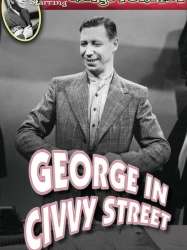
George in Civvy Street (1946)
, 1h19Réalisé par Marcel Varnel
Origine Royaume-uni
Genres Comédie
Acteurs George Formby, Ronald Shiner, Ian Fleming, Wally Patch
Rôle Mary Colton
Note65%





This comedy film portrays George Formby leaving the forces and becoming a village pub owner, who works to turn a waitress from her current boss, a rival pub owner. Formby falls in love with the waitress, and various battles ensue between the pub rivals.
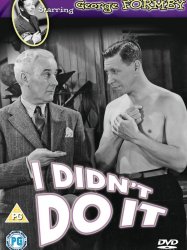
I Didn't Do It (1945)
Réalisé par Marcel Varnel
Genres Comédie, Policier
Acteurs George Formby, Carl Jaffe, Wally Patch, Ian Fleming, Dennis Wyndham, Jack Raine
Rôle George Trotter
Note62%





An actor staying at a theatrical boarding house is framed for a murder.

He Snoops to Conquer (1944)
, 1h43Réalisé par Marcel Varnel
Origine Royaume-uni
Genres Comédie
Acteurs George Formby, Elizabeth Allen, Elizabeth Allan, Aubrey Mallalieu, Gordon McLeod, Katie Johnson
Rôle George Gribble
Note63%





The film is set in immediate post-war Britain. After being ordered to do a piece on town planning two newspapermen randomly pick on the small, industrial town of Tangleton. After arriving at the town hall the only man they can find working is the odd job man, George Gribble, who gives them a guided tour of the town. However, they run a negative angle on the story highlighting the fact that the wealthy leader of the council, Mr Oxbold, lives in a giant house by himself while Gribble is one of fourteen staying in a tiny slum house. When they read the article, the town's leaders order Gribble to do an public opinion investigation around the town. Instead of doing a cross section as ordered, he interviews the entire town's population. The results he produces shock the town's complacent leaders, who discover the people are deeply unhappy with the status quo and wants radical changes in living conditions and other services. This is a blow to the council leader and his colleagues who all have financial interests in keeping the town as it is. Oxbold is a slum landlord who fears a Whitehall scheme to demolish much of the existing town and rebuild it with council houses. To avert this, Oxbold and his colleagues decide to send off to London only those limited number of forms which praise the current situation. Gribble is ordered to burn the rest but, not wishing to waste paper, he puts them out for salvage instead.

Bell-Bottom George (1944)
, 1h37Réalisé par Marcel Varnel
Origine Royaume-uni
Genres Guerre, Comédie
Thèmes Documentaire sur la guerre, Documentaire historique, Musique, Politique, Documentaire sur la Seconde Guerre mondiale
Acteurs George Formby, Reginald Purdell, Anne Firth, Peter Murray-Hill, Dennis Wyndham, Eliot Makeham
Rôle George Blake
Note58%





George Blake (Formby) is a waiter with ambitions to join the Navy, although he's been rejected several times, because of a weak heart. But during an air raid he's mistaken for a sailor because he's wearing the clothes of a navy friend who's borrowed his to go to a Lock-in at a pub. George is spotted by military police who think he is AWOL and escort him back to Naval barracks. He impresses the sailors there with his songs and ukulele playing, and is recruited to play at the "Spick and Span" troop radio concert in London. Somehow, along the way, he stumbles on a group of Nazi spies using a taxidermists shop as a front, and foils their plot to blow up a British submarine, "The Firefly". He also impresses and wins the heart of Pat (Anne Firth}, the Wren he's fallen for.

Get Cracking (1943)
Réalisé par Marcel Varnel
Genres Guerre, Comédie, Romance
Thèmes Documentaire sur la guerre, Documentaire historique, Politique, Documentaire sur la Seconde Guerre mondiale
Acteurs George Formby, Dinah Sheridan, Edward Rigby, Ronald Shiner, Frank Pettingell, Harry Fowler
Rôle George Singleton
Note59%





This comedy explores the wayward rivalry between mechanic and Home Guard lance corporal George Singleton (George Formby) and an adversary also in the Home Guard (Ronald Shiner). When the rival Home Guard units of Major Wallop and Minor Wallop are sent on battle manoeuvres, George Singleton (Formby) launches his own unique style of commando raid against neighbouring Major Wallop to steal a Vickers machine gun. The raid fails and Singleton loses his lance corporal's stripe, so he and a little evacuee girl named Irene (Vera Frances) decide to fall back on 'Plan B' - to build their very own tank. The venture is such a success that George is made a sergeant.

Much Too Shy (1942)
Réalisé par Marcel Varnel
Genres Comédie
Acteurs George Formby, Kathleen Harrison, Hilda Bayley, Joss Ambler, Frederick Burtwell, Charles Hawtrey
Rôle George Andy
Note61%





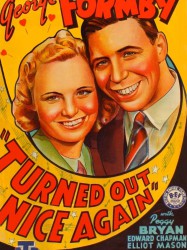
Georges roi de la mode (1941)
, 1h21Réalisé par Marcel Varnel
Origine Royaume-uni
Genres Comédie, Musical
Thèmes La musique, Théâtre, Musique, Adaptation d'une pièce de théâtre
Acteurs George Formby, Elliott Mason, Edward Chapman, Ronald Ward, Wilfrid Hyde-White, Michael Rennie
Rôle George Pearson
Note62%





George Pearson travaille comme contremaître chez Dawson, une entreprise de lingerie qui fabrique des sous-vêtements féminins avec des modèles désuets. Lorsque le directeur de l'usine, Nelson, est licencié pour avoir trompé l'entreprise, George est promu à sa place. George se précipite chez lui pour dire à sa fiancée, Lydia, que son salaire a été augmenté, et qu'ils vont enfin pouvoir se marier. George révèle anxieusement ses plans de mariage à sa mère dominatrice. Elle fait semblant d'avoir des problèmes cardiaques pour gagner sa sympathie et maintenir son emprise sur George. Lorsque les jeunes mariés emménagent dans leur nouvelle maison, elle continue d'entraver leur relation comme elle le peut.

South American George (1941)
, 1h32Réalisé par Marcel Varnel, Leslie Arliss
Origine Royaume-uni
Genres Comédie
Acteurs George Formby, Linden Travers, Enid Stamp Taylor, Felix Aylmer, Ronald Shiner, Alf Goddard
Rôle George Butters / Gilli Vanetti
Note60%





A press agent hurries to bring in a substitute after a South American opera star flops. A lookalike takes over from the tenor, but chaos ensues when the bogus singer finds himself hunted by paid assassins.

Georges se débrouille (1940)
, 1h22Réalisé par Marcel Varnel
Origine Royaume-uni
Genres Guerre, Comédie, Espionnage, Musical
Thèmes Espionnage, Documentaire sur la guerre, Documentaire historique, Musique, Politique, Documentaire sur la Seconde Guerre mondiale
Acteurs George Formby, Phyllis Calvert, Bernard Lee, Garry Marsh, Coral Browne, Romney Brent
Rôle George Hepplewhite
Note63%





À Bergen en Norvège, un espion britannique, qui agit sous couverture comme musicien, est tué lors d'un spectacle. En fait les services britanniques pensent qu'il était un agent double travaillant pour les Nazis et donnant des informations aux sous-marins allemands sur les navires marchands en utilisant un code lié à la musique de l'orchestre auquel il appartenait, musique qui passait à la radio.
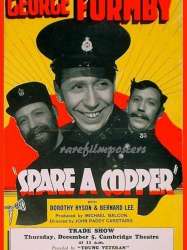
Spare a Copper (1940)
, 1h17Réalisé par John Paddy Carstairs
Origine Royaume-uni
Genres Comédie, Musical
Thèmes Documentaire sur la guerre, Documentaire historique, Musique, Politique, Documentaire sur la Seconde Guerre mondiale
Acteurs George Formby, Dorothy Hyson, Warburton Gamble, Bernard Lee, John Turnbull, George Merritt
Rôle George Carter
Note61%





Formby plays a bumbling War Reservist police officer called George Carter who aspires to become a member of the flying squad. The film is set in Merseyside where the battleship HMS Hercules is being built. A group of saboteurs are planning to destroy HMS Hercules by blowing it up. George manages to foil the saboteurs' attempts to destroy HMS Hercules, saving the battleship from being blown up by saboteurs. One of the saboteurs, called "Jake", is played by Bernard Lee.

Come on George! (1939)
, 1h28Réalisé par Anthony Kimmins
Origine Royaume-uni
Genres Comédie, Musical
Thèmes Mise en scène d'un animal, Sport, Les chevaux, Musique, Equitation
Acteurs George Formby, Dirk Bogarde, Pat Kirkwood, Joss Ambler, Meriel Forbes, George Carney
Rôle George
Note62%





This farce stars comedian George Formby, who plays George, a stable boy. He also has the unique ability to soothe an anxious racing horse. Expectedly, George races the horse and wins.

Trouble Brewing (1939)
, 1h27Réalisé par Anthony Kimmins
Origine Royaume-uni
Genres Comédie, Comédie romantique, Musical, Romance
Thèmes Sport, Musique
Acteurs George Formby, Googie Withers, Gus McNaughton, Esma Cannon, Garry Marsh, C. Denier Warren
Rôle George Gullip
Note62%





George Formby plays a Daily Sun compositor who wins a large sum at the racing. He is paid with counterfeit notes. Formby’s character (George Gullip) then tries to find the criminals. In the process he goes "under cover" as a waiter and a wrestler. Clues suggest the villain is Gullip’s own boss.

I See Ice (1938)
, 1h24Réalisé par Anthony Kimmins
Origine Royaume-uni
Genres Comédie, Musical
Thèmes Musique
Acteurs George Formby, Kay Walsh, Betty Stockfeld, Cyril Ritchard, Garry Marsh, Frederick Burtwell
Rôle George Bright
Note59%





The farcical adventures of a prop man (George Formby) with a touring ice ballet. Inventing a new sort of candid camera in his spare time, and concealing it in a bow-tie, our hero gets into a mess of trouble when he takes an incriminating photo of an important man; pulls a communication cord; winds up in jail; referees a hockey match; finds himself in a stage show dressed as a cosack; woos an attractive young ice skater (Kay Walsh); and eventually wins a job on a newspaper.

It's in the Air (1938)
, 1h27Réalisé par Anthony Kimmins
Origine Royaume-uni
Genres Comédie
Thèmes Transport, Aviation
Acteurs George Formby, Jack Benny, Jack Hobbs, Garry Marsh, C. Denier Warren, Michael Shepley
Rôle George Brown
Note62%





This script must be run from the command line
 Connexion
Connexion


